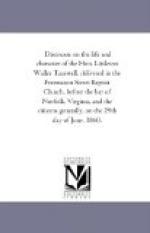There were, however, some differences between them, which, or some of which, observable at first, grew more distinct in the lapse of years, in their places of nativity, in their temperaments, in their intellectual traits, and in their politics. Both were partly of Gallic descent; but here they differed as in other things. Tazewell was French on the father’s side; Taylor on the mother’s. Tazewell’s ancestors were from that city on the banks of the Seine in which the piratical Northmen had dwelt, which they had made the capital of a warlike empire extorted from one of the drivelling descendants of Charlemagne, and which they had called by the defiant title of Normandy. Taylor’s ancestors belonged to that pious and not less heroic race, which, under the name of Huguenots, battled, not for rapine and conquest, but for the rights of conscience and for a large public liberty, and which, though defeated and driven from their ancestral land, the beautiful land of the fig, the olive, and the vine, to the chalky shores of old England, were more than triumphant in the virtue of their cause. The music familiar to the ears of Tazewell’s ancestors was the wind from the boisterous North Sea and the turbulent Bay of Biscay; while Taylor’s forefathers were refreshed by the gentle gales of Araby blown across the blue Mediterranean to the banks of the Rhone. The blood of both had been strongly mixed with the blood of that Anglo-Saxon race, which, crushed at times, and even for centuries, was apt to rise again, and build its fortresses to freedom out of the ruins of the very temples of its oppressors.
Tazewell was born on the north side of the James, Taylor on the south—a distinction of no little significance in Virginia politics to this very hour. Tazewell, insensibly imitating those grave old rovers of the sea whom he counted among his kin, was, even under great provocation, cool and wary, and only the more dangerous; Taylor, whose southern blood coursed in torrents of fire through his veins, though at times in the highest degree self-poised and calm, had less command of his temper, and showed more plainly the smart of the hostile shaft; and, though prompt as lightning to return it, did not always send it back to the enemy as steadily as he might have done with more deliberation. Their modes of reasoning differed as widely as their temperaments. Each was a supreme master of reasoning in his respective department; and, if we look along their entire course at the bar, it is hard to say which of the two won the most verdicts. Perhaps, though both of these able men wielded at times an almost omnipotent sway over juries and over the bench; yet it may be said that the style of Tazewell was more decisive with the court, and that of Taylor with the jury. Each seemed necessary to the greatness of the other; and it is probable that, if Tazewell had not been constantly pressed throughout his career by such a man as Taylor, he would never have made those wonderful displays




